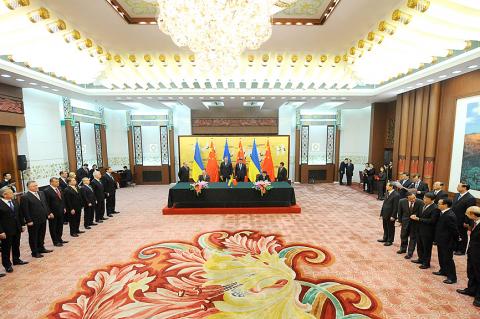Wang Jing (王靖), a little-known Chinese investor who has a concession to build a waterway in Nicaragua to rival the Panama Canal, announced he was also spearheading a US$3 billion project to build a deepwater port in Ukraine.
“The strategic and cooperative partnership between China and Ukraine has moved a step forward,” Wang said at a press conference in Beijing on Thursday. “Even though this project is relatively big, you can say we fell in love at first sight.”
A senior Ukrainian official told Reuters, however, that she had not heard about the project.

Photo: Reuters
“I can say that such a project did not pass through our ministry,” she said.
The 300 hectare port project is to be located about 60km north of Sevastopol on the Black Sea. Wang unveiled it at the same time that Ukrainian President Viktor Yanukovych was visiting China’s capital.
China and Ukraine signed several agreements on airlines, new energy sources, coal and travel during Yanukovych’s visit. No details or figures were provided.
In a joint statement, the two countries said they had signed a “treaty of friendly cooperation,” which “marks a stride toward a higher level of development in relations between China and Ukraine.”
Yanukovych is under pressure at home to show the success of his economic strategy amid public protests against his worsening relationship with the EU.
“In this very difficult situation it is very important for Yanukovych to conclude large-scale projects,” Volodymyr Fesenko of Ukrainian think tank Penta said.
“The implementation of these projects will depend on how the political crisis is resolved,” he said.
Chinese Vice Minister of Foreign Affairs Cheng Guoping (程國平) told journalists that Ukraine was in “flux.”
“I believe the Ukrainian government has the ability to, within the scope of the law, safeguard Ukraine’s stability in this situation and continue on its own path to development,” he said.
A memorandum of understanding was signed earlier in the day between Wang’s Beijing Interoceanic Canal Investment Management Co (北京大洋新河投資) and Kievgidroinvest, a little known hydrogeology research firm registered in Sevastopol, which does not have a Web site.
The port project, to be built on a dried-out lake on the Crimean coast, would require a US$3 billion investment in its first phase, Wang said, providing few further details.
Ukraine already operates more than a dozen big ports.
Wang, who says his initial wealth came from a gold mine investment in Cambodia, grabbed headlines earlier this year when Nicaragua’s Congress granted his Cayman Islands-registered company a 50-year concession to develop a US$40 billion canal.
He is chairman of Beijing Xinwei Telecom Technology Co (北京信威通信), a wireless equipment company that holds the patents on Chinese technology for 3G mobile telecoms. That technology is now being superseded by next-generation networks.
Kievgidroinvest chief executive Alexsey Mayzuk said at the press conference that his company had preferred Wang’s firm over a large-scale, state-owned enterprise.
“We want a partner who is not purely a construction partner,” he said. “We need a partner who is also a strategic partner.”

With an approval rating of just two percent, Peruvian President Dina Boluarte might be the world’s most unpopular leader, according to pollsters. Protests greeted her rise to power 29 months ago, and have marked her entire term — joined by assorted scandals, investigations, controversies and a surge in gang violence. The 63-year-old is the target of a dozen probes, including for her alleged failure to declare gifts of luxury jewels and watches, a scandal inevitably dubbed “Rolexgate.” She is also under the microscope for a two-week undeclared absence for nose surgery — which she insists was medical, not cosmetic — and is

CAUTIOUS RECOVERY: While the manufacturing sector returned to growth amid the US-China trade truce, firms remain wary as uncertainty clouds the outlook, the CIER said The local manufacturing sector returned to expansion last month, as the official purchasing managers’ index (PMI) rose 2.1 points to 51.0, driven by a temporary easing in US-China trade tensions, the Chung-Hua Institution for Economic Research (CIER, 中華經濟研究院) said yesterday. The PMI gauges the health of the manufacturing industry, with readings above 50 indicating expansion and those below 50 signaling contraction. “Firms are not as pessimistic as they were in April, but they remain far from optimistic,” CIER president Lien Hsien-ming (連賢明) said at a news conference. The full impact of US tariff decisions is unlikely to become clear until later this month

GROWING CONCERN: Some senior Trump administration officials opposed the UAE expansion over fears that another TSMC project could jeopardize its US investment Taiwan Semiconductor Manufacturing Co (TSMC, 台積電) is evaluating building an advanced production facility in the United Arab Emirates (UAE) and has discussed the possibility with officials in US President Donald Trump’s administration, people familiar with the matter said, in a potentially major bet on the Middle East that would only come to fruition with Washington’s approval. The company has had multiple meetings in the past few months with US Special Envoy to the Middle East Steve Witkoff and officials from MGX, an influential investment vehicle overseen by the UAE president’s brother, the people said. The conversations are a continuation of talks that

CHIP DUTIES: TSMC said it voiced its concerns to Washington about tariffs, telling the US commerce department that it wants ‘fair treatment’ to protect its competitiveness Taiwan Semiconductor Manufacturing Co (TSMC, 台積電) yesterday reiterated robust business prospects for this year as strong artificial intelligence (AI) chip demand from Nvidia Corp and other customers would absorb the impacts of US tariffs. “The impact of tariffs would be indirect, as the custom tax is the importers’ responsibility, not the exporters,” TSMC chairman and chief executive officer C.C. Wei (魏哲家) said at the chipmaker’s annual shareholders’ meeting in Hsinchu City. TSMC’s business could be affected if people become reluctant to buy electronics due to inflated prices, Wei said. In addition, the chipmaker has voiced its concern to the US Department of Commerce